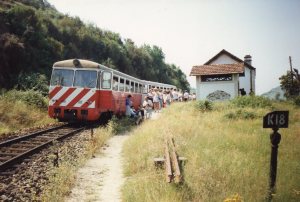The point has probably been overstressed, but from that visit to Taylors in the mountains, we had a wonderful time. The bus ride back to Lamego, the next day where we did our individual projects, and then our final night up there, terribly sorry as we looked from the utmost balcony of the staircase down on the fairylit market square, as we never really wanted to leave this place.
Leave we did, but we did it in style, and our luck with transport continued. We had to catch a narrow gauge train from Regua up the Tua valley to Vila Real. A little two car diesel train was laid on as usual, but as well as the usual mix of Portuguese peasants, there was our entourage, and a group of twenty or so British train enthusiasts. We crowded onto this little train which then strained out of the station and started to rise up the valley. The scenery was breathtaking for the whole route, the railway wrapped around the contours instead of bridging any gap, so we twisted and turned in amongst the woods and terraces. It lurched over rough track and struggled up the steep gradients. But the combined weight of train enthusiasts and students with the usual was too much and at a little station 18 Kilometres from Regua, we paused, and stopped, and everyone got off, and the news filtered back that the engine had overheated.
Although an actual station it was truly in the middle of nowhere, and there seemed no way that people could get in or out. Our coach had left us at Regua and was to meet us at Vila Real at the other end, and there were no mobile phones to ring around then. So, in the heat of the day, with crickets buzzing around, we stood and waited for the engine to cool down. The driver finally decided to give it a go, and we all trooped back in like something from a Reverend Awdry story and he got the engine going. He eased us gently out of the station and rattled along for another hour before arriving, safe and sound in Vila Real.
The coach now started to head for Porto , but as with our trip up, we took a circuitous route. We stopped for lunch in the lovely little city of Amarante, its neat little cathedral next to a sturdy bridge, everything from the fountains and walls to the plant pots and gargoyles made of the same brown granite. On the wide stretch of river beside us, a few day-trippers paddled the strangest boats around, basic flat planks with two seats and an umbrella sticking up.
The afternoon heat was dreadful, and we stopped at a park atop a hill, a long avenue of wide shady trees affording us some comfort from the worst ravages of the heat. Then we headed back to Porto. It must have been less than thirty miles, but the roads were dreadful. Most of the gang were tired by now, but somehow, I had been left with Mike’s two little boys sitting next to me. We started chatting as you do to young boys, them telling you the most ridiculous stuff about the toys they are playing with, but we progressed on to telling jokes. Unfortunately, some of the best ones they told to their mother, and she was not amused when one of them went up to her and said “What’s green and goes backwards”, and then did a huge sniff. I got told off for that. I thought it safer to think of some old campfire songs I knew from my scouting days, and taught them “Going on a lion hunt”. Alison in our group told me that she learnt it I the Guides as “Going on a Bear Hunt”, but it worked just the same with a lion. You stick your tongue against the back of the bottom lip and sing. The leader tells you what to sing and everyone else repeats it. This great work goes like this:
Going on a lion hunt
(Going on a Lion hunt)
I’m not scared
(I’m not scared)
Got me gun by me side
(Got me gun by me side)
Bullets too!
(Bullets too!)
Coming to some mud
(Coming to some mud)
Can’t go round it
(Can’t go round it)
Can’t go over it
(Can’t go over it)
Have to go through it
(Have to go through it)
Schlup Schlup Schlup
This gets repeated with a tree (one potato, two potato type movements) and some grass (Swish swish swish swish) before
Coming to a cave etc.
Ooh its dark in here
I can feel something furry
It’s very warm
It’s got a big mane
IT’S A LION
Dum dum dum dumdumdumdumdumdumdum Swish swish swish dumdumdumdumdumdumdumdum Plop plop plop plop dumdumdumdumdumdumdum Schlup Schlup
It then finishes with everyone vowing never to go on another lion hunt………
You have to be there. Whatever, the kids loved it, and although almost everyone else was supposed to be asleep, they all overheard me keeping the kids entertained and insisted I taught them Lion Hunt in a bar in Villa Nova de Gaia that night. We got thrown out soon after.




